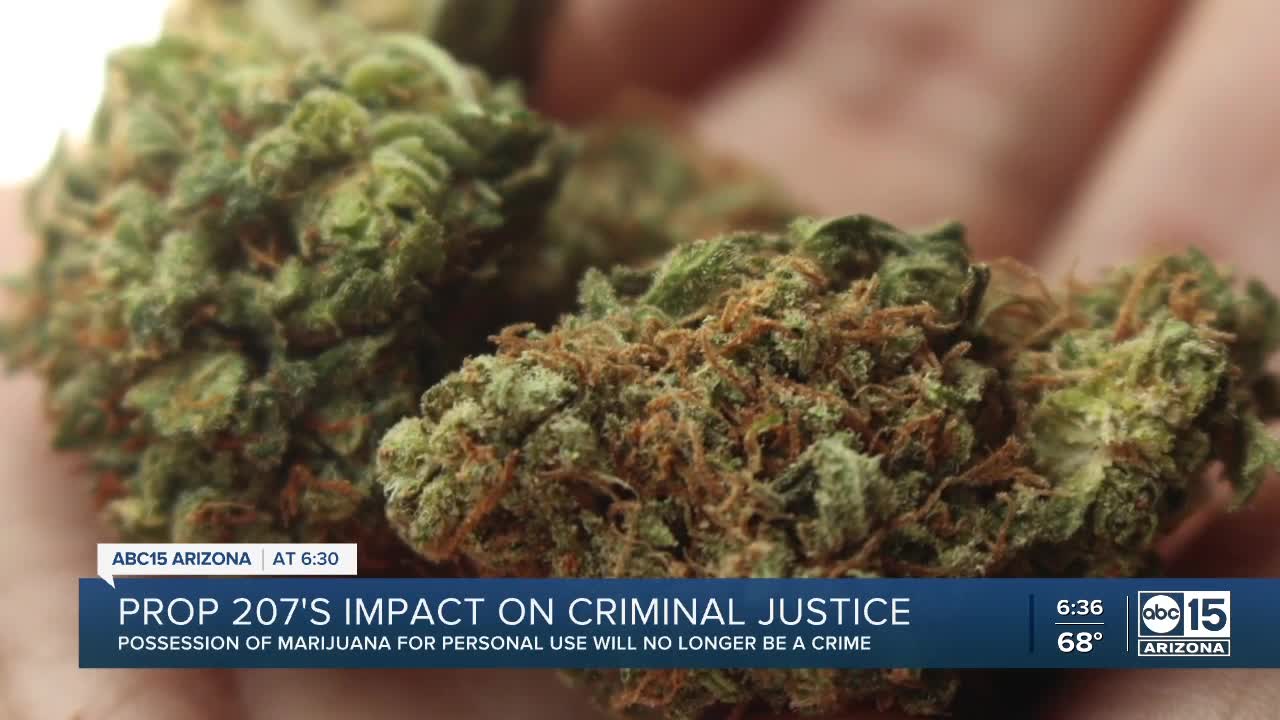One big component of Prop 207, the initiative that legalized marijuana for recreational use in Arizona is criminal justice reform. The initiative decriminalizes possession of small amounts of pot for personal use. It also calls for the creation of an expungement process to help those who have been convicted of previous felonies the opportunity to clear the felony off their records.
Those criminalized by the possession of pot are hailing this change saying their lives were almost destroyed by having a felony on their records. For Chris Martin, the owner of Hempful Farms, a business that sells hemp and CBD based food and products, it happened when he was a 20-year-old in college.
Martin says he was sent to prison for three years after authorities found a joint in his dorm room.
"It's kind of mind-blowing that that was the end result for something so little, for small possession. I went to play baseball at Yavapai Community College and I got caught with a joint in my dorm room which was back then considered a pretty hefty felony because we were in a drug-free school zone. That got me three years in prison," said Martin.
Even after serving the time, Martin said it was tough to get his life back on track because he was considered a felon.
"It makes life terrible. I have never been able to buy a home, or get a loan. My business has been denied three loans because of this pandemic," said Martin.
Even after Medical marijuana was legalized in Arizona, Martin was criminalized for growing too much pot at home. He had a care-givers license and was able to grow his own marijuana because dispensaries had not been licensed in the state yet.
Martin said he was supposed to throw away any excess marijuana above the state limits, but instead of wasting it, he decided to use it to make candy bars, cookies, and donated what he could to compassion clubs created for those who needed access to medical marijuana and could not grow their own product.
His home and commercial kitchens were raided by federal authorities in 2012, and Martin was slapped with long list of charges that included drug possession and distribution.
"When I got raided in 2012, I was charged with 15 felonies. Everything from criminal syndication because I rode in a motorcycle club that supported veterans, to manufacturing narcotics as if I was manufacturing meth under my house or something, and it was all for chocolates and oils and extractions," said Martin.
He was sent back to prison for another 2 years after authorities found a gun locked in a safe in a back bedroom of the home. Thanks to his felony conviction stemming from the joint he had in college, Martin was not allowed to possess a gun.
Martin said he realized not all of the charges against him would be expunged with the passage of Prop 207, but he hoped to get the marijuana charges dropped once the process was set up for expungement.
Jennifer Liewer, a spokeswoman with the Maricopa County Attorney's office said their office had already decided to drop all cases involving simple possession of pot, because Prop 207 made it clear, that was the will of Arizona voters.
"Next July there will be a process put in place where people who have been convicted of personal possession of marijuana will be able to have those convictions essentially removed from their records," said Liewer.
Martin said he felt it was about time, and he hoped no one else would have to be criminalized and demonized the way he had been, for one joint and a few candy bars laced with marijuana.
"Your wine coolers will probably pack more of a punch than these candy bars ever would. My suggestion to authorities is honestly, we got bigger fish to fry than worry about people with pot," said Martin.
ABC15 asked the Maricopa County Attorney's office how many cases would be dismissed after the passage of Prop 207. In a statement Liewer said:
"We have a little less than 6,000 cases with charges that include a count covered by Prop 207. We have to review each individually, and expect to find that most of those can be dismissed. However, a significant number will include other felony charges – meaning that the entire case will not be dismissed, only those charges covered by Prop 207. Where the case is in the system does play a role in how we will deal with it.
We have about 3500 bench warrants that include charges impacted by Proposition 207. If the bench warrant is only for charges covered by Prop 207, it will be dismissed now.
We have approximately 1400 charges that are in the preliminary hearing stage, meaning we have filed the case and are waiting for a determination of probable cause.
Approximately 1,000 charges that have been submitted, our attorneys reviewed and determined that charges could be filed, but have not yet been filed. We will be able to reverse the decision before charges are filed.
Finally, there are approximately 180 cases in the trial phase, which includes charges covered by Prop 207.
I know these are a lot of numbers but for defendants and defense attorneys, the stage of the case is important.
Again, I want to reiterate that these are numbers for charges, not cases. Many cases include other felony charges, in addition to the charges covered in Prop 207. We will not be able to know a true number of cases impacted until we individually review all of them."




